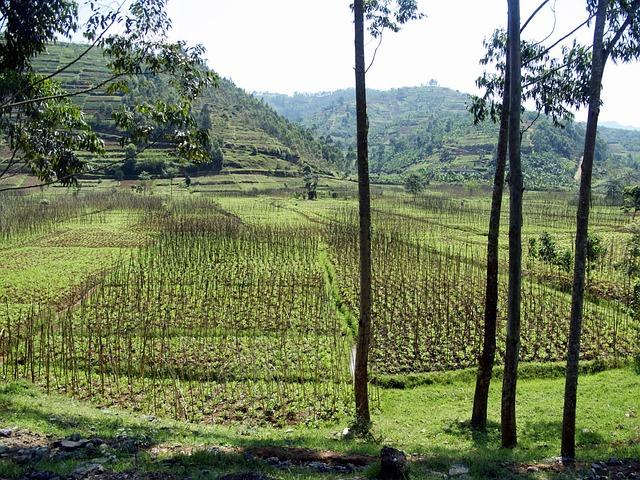In a bold response to Canada’s recent export ban linked to the ongoing conflict in the Democratic Republic of the Congo (DRC), Rwanda has voiced strong criticism, labeling the decision as “shameful.” The ban, which targets military equipment and certain dual-use goods destined for Rwanda, is aimed at curbing the flow of weapons that could possibly escalate tensions in the DRC, where a complex web of political and military grievances continues to fuel violence. Rwanda’s government has argued that such measures do not address the underlying issues of the conflict and instead undermine regional stability. This article delves into the implications of Canada’s decision, Rwanda’s reaction, and the broader context of international relations in the Great Lakes region of Africa. As diplomatic tensions rise, the situation raises critical questions about the effectiveness of export bans and their impact on peace efforts in one of the world’s most troubled regions.
Rwanda’s Response to Canada’s Export Ban: A diplomatic Standoff
In a strong response to Canada’s recent export ban linked to allegations surrounding the Congo war, Rwanda has labeled the action as “shameful” and a significant misstep in diplomatic relations. The Rwandan government asserted that the ban unfairly targets it’s economy and the nation’s key industries, primarily in the defense and agriculture sectors. Officials emphasized that rather than fostering dialog and understanding, Canada’s approach has escalated tensions and hindered progress toward regional stability. Rwanda’s Foreign Affairs Minister expressed disappointment, citing a need for constructive engagement that promotes mutual benefits rather than punitive measures.
To further illustrate the impact of this embargo, the Rwandan government has compiled a brief overview of sectors most affected by the export ban:
| Sector | Impact |
|---|---|
| Defense | Reduction in tech supplies and equipment |
| Agriculture | Decreased exports affecting farmers’ income |
| Mining | Impact on mineral exports and revenue |
Rwanda maintains that the accusations leading to the ban are based on flawed assessments and a lack of comprehensive understanding of the complex regional dynamics. The Rwandan leadership has urged Canada to reconsider its position and rather collaborate on efforts to address the underlying issues in the Great Lakes region. Considering these developments, analysts suggest that Rwanda may seek new partnerships with nations willing to support its economic interests and diplomatic standing, potentially redefining its international alliances.
Understanding the Impact of Export Restrictions on Rwanda and Regional Stability
The recent export restrictions imposed by Canada over military supplies destined for Rwanda have sparked significant controversy, especially in light of ongoing tensions related to the conflict in the Democratic Republic of the Congo (DRC). Rwanda’s government has labeled the ban as “shameful,” asserting that such actions not only undermine its sovereign right to self-defense but also exacerbate regional instability. These restrictions on military exports can have far-reaching implications, potentially curtailing Rwanda’s capacity to engage effectively in regional security dialogues and counter any threats that arise from continuing instability in the DRC.
In the larger context of regional politics, export restrictions can create a domino effect, influencing both military dynamics and diplomatic relations across borders. the looming repercussions may include:
- Increased Military Tensions: Countries in the region may feel compelled to enhance their military readiness in response to perceived threats.
- Shift in Alliances: Nations may seek alternative partnerships or alliances,shifting the balance of power in the region.
- Economic Impact: Reduced access to military supplies can hinder rwanda’s ability to maintain security, which is essential for economic progress.
Moreover, the regional leaders may find themselves under pressure to navigate the intricacies of international diplomacy while managing internal security needs. Understanding these dynamics is crucial for addressing the root causes of conflict and fostering a more stable and secure environment in the Central african region.
Historical Context: The Rwanda-Congo Relations and Their Consequences
The entangled history between Rwanda and the democratic Republic of the Congo (DRC) is rooted in decades of political strife and ethnic tensions,leading to profound ramifications that extend beyond their borders.Following the Rwandan Genocide in 1994, which resulted in the mass slaughter of Tutsi and moderate Hutu populations, a wave of Rwandan Hutu militants fled across the border into eastern Congo. This exodus exacerbated local conflicts, as Rwandan authorities sought to neutralize threats posed by these groups. In the ensuing chaos, the Congo became embroiled in a series of conflicts known as the First and Second Congo wars (1996-2003), which not only destabilized the region but also left millions dead and displaced, highlighting the complex interplay of ethnic rivalry and resource exploitation.
The consequences of this tumultuous history manifest in ongoing disputes over resources, as both nations grapple with the legacies of war. Today, Rwanda’s strategic interests in the eastern DRC are primarily driven by both security concerns and economic aspirations. The region is rich in valuable minerals, including coltan and gold, which are sought after globally. Moreover, accusations of rwandan support for various rebel groups in the DRC persist, straining diplomatic relations. In response to external pressures, including Canada’s export ban linked to the DRC conflict, Rwanda has criticized the actions as unjust while asserting its right to safeguard its national security. This dialogue reflects broader themes of accountability, sovereignty, and the intertwining fates of the two nations as they navigate the ongoing ramifications of their shared history.
Analyzing Canada’s Justification for the Export Ban on Military Supplies
Canada’s recent decision to impose an export ban on military supplies destined for troubled regions like the Democratic Republic of Congo (DRC) has sparked significant debate among international observers and involved nations. Officials from Rwanda have publicly condemned the ban, labeling it as “shameful” and claiming it undermines regional stability, particularly in the context of the ongoing conflict in eastern Congo. Proponents of the ban argue that it is a necessary step to prevent further arms from fueling violence and humanitarian crises. They highlight key justifications for the policy, including:
- Human Rights Concerns: Canada aims to uphold international standards by reducing the risk of military supplies being used to commit atrocities.
- Prevention of Escalation: The ban is seen as a proactive measure to prevent the regional arms race that could lead to wider conflicts.
- International Reputation: By taking a stand against arms exports, Canada seeks to reinforce its commitment to peacekeeping and global stability.
However, critics argue that this stance could unintentionally exacerbate existing tensions between neighboring countries, particularly Rwanda, which has vested interests in the DRC’s political landscape. They emphasize that the ban could inhibit legitimate defense capabilities and exacerbate security vulnerabilities for nations trying to maintain peace in the region. To better understand the impact of this policy, it’s significant to consider various perspectives regarding military export regulations, military readiness, and regional alliances. Below is a simplified outline of the potential consequences:
| Viewpoint | Argument |
|---|---|
| Supporters of the Ban | argue that reducing arms flow is essential for humanitarian protection. |
| Critics of the Ban | Believe it could destabilize regional power dynamics and leave allies defenseless. |
Recommendations for Constructive Dialogue and Conflict Resolution
In the face of escalating tensions surrounding the Congo conflict, fostering constructive dialogue between involved nations is paramount. Prioritizing open communication can pave the way for lasting solutions. Both Rwanda and Canada,along with other stakeholders,should engage in obvious discussions to understand each other’s perspectives and concerns. Establishing multilateral forums that include diverse viewpoints can enhance mutual understanding and encourage collaborative approaches to resolving issues. below are key strategies for effective dialogue:
- Active Listening: Promote an environment where all parties feel heard and respected.
- Focus on Common Goals: Emphasize shared interests, such as regional stability and humanitarian aid.
- seek Mediation: Utilize neutral parties to facilitate conversations and ensure productive outcomes.
Additionally,conflict resolution efforts can benefit significantly from a structured approach that addresses root causes rather than mere symptoms. Implementing track-two diplomacy involving civil society can foster grassroots support and create avenues for peace. Engaging in community-level dialogues can lessen animosity and promote a shared vision for the future. A simplified portrayal of potential conflict resolution mechanisms is shown in the table below:
| Mechanism | Description |
|---|---|
| Negotiation | Direct discussions to reach consensus on contentious issues. |
| Dialogue Platforms | Forums where stakeholders can exchange views in a controlled environment. |
| Public Campaigns | Awareness initiatives aimed at educating citizens on the benefits of peace. |
The Role of International Communities in Addressing Export Restrictions and Promoting Peace
International communities play a pivotal role in addressing the complex web of export restrictions while simultaneously promoting peace in conflict-affected regions. These stakeholders, including multilateral organizations, NGOs, and intergovernmental bodies, are essential in creating a framework that discourages punitive measures that may exacerbate tensions.Efforts to impose export bans, such as Canada’s recent restrictions regarding the ongoing conflict in the Congo, can often be perceived as counterproductive. Instead of fostering dialogue and cooperation, such actions may entrench divisions and exacerbate existing conflict.The voices of nations like Rwanda highlight the need for a more nuanced approach that prioritizes engagement and constructive solutions.
to mitigate the adverse effects of export restrictions and bolster peace, international communities must focus on fostering transparency and accountability through various means:
- Diplomatic engagement: Encouraging open discussions between affected countries to negotiate export policies that do not impair economic stability.
- Capacity building: Assisting nations like Rwanda and the Congo in developing robust governance frameworks that prevent the misuse of resources.
- Cooperative monitoring: Establishing verification mechanisms that allow for the responsible trade of critical resources while ensuring compliance with peace agreements.
addressing export restrictions requires a collaborative effort, where international communities act not only as mediators but also as facilitators of sustainable development. By prioritizing peace over isolation, the global community can create an environment conducive to stability, allowing nations to overcome historical grievances and move towards a more prosperous future.
Closing Remarks
Rwanda’s vehement response to canada’s recent export ban in connection with the ongoing conflict in the Democratic Republic of Congo underscores the complexities of international geopolitics. The Rwandan government has characterized the ban as “shameful,” highlighting the interconnectedness of regional stability and foreign policy decisions. As tensions continue to rise in Central Africa, the implications of such measures resonate beyond immediate economic impacts, potentially influencing diplomatic relations and the humanitarian landscape in the region. Stakeholders from both sides must navigate this fraught terrain carefully,weighing the moral imperatives of intervention against the strategic interests at play. As global attention remains fixed on the situation in the DRC, the consequences of Canada’s actions will likely reverberate, prompting discussions on the responsibilities of nations in peacekeeping and conflict resolution. The evolving dynamics warrant close monitoring, as the outcomes will have lasting implications not only for Rwanda and Canada but for the broader international community engaged in the quest for peace and stability in Africa.

